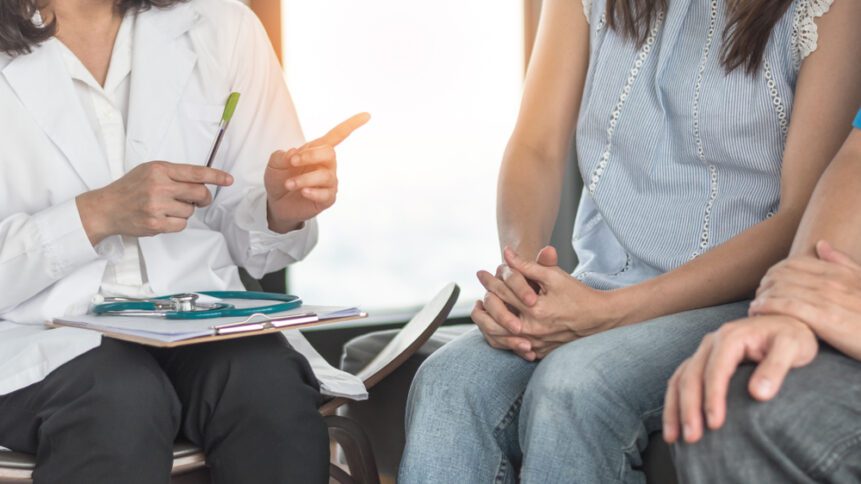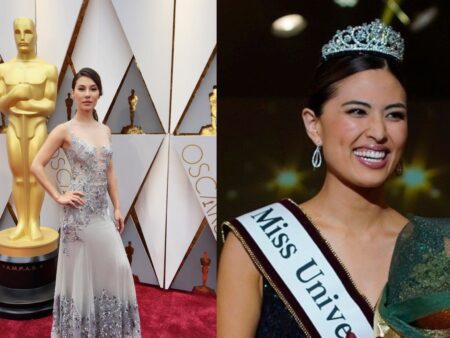
When I graduated high school, a friend signed in my yearbook, “Anything is possible. Don’t live to regret anything.” For some reason it stuck with me — it’s nice, if naïve, to believe we could get through life without regrets. Twenty years later, as I struggled to stay pregnant, I spent a lot of time pondering regrets. I anonymously trolled fertility forums, reading threads asking the question, “How do you know when to walk away?”
I had thought the physical part of IVF would be the scariest and hardest, but it wasn’t. The hard part was losing another possible future every time we had a miscarriage. Would our future even contain a child? Could we be happy either way? And, critically, would my breast cancer come back?
When my husband and I had first entertained the idea of IVF, it had all seemed daunting. So many needles, and scary procedures also involving needles. We put off that decision.
I had thought the physical part of IVF would be the scariest and hardest, but it wasn’t.
In the meantime, our reproductive endocrinologist had recommended that I have a regular physical check-up before beginning any IVF procedures. I went into my OB/GYN expecting a mundane visit.
I came out clutching a referral for a mammogram because the nurse had felt a lump. Everyone reassured me it was probably nothing. It was cancer.
Suddenly our plans for IVF both didn’t matter and mattered a lot.
A cancer diagnosis puts you in a terrifying whirlwind as you try to figure out how bad it is. When the dust finally settled for me, it turned out that I was a lucky one. The cancer was slow and non-aggressive (rare in a 37-year-old), though chemo was not off the table yet. Chemo would mean the possibility of early menopause, which could dash our hopes for a pregnancy.
A couple of years of putting off the IVF decision had finally come to a head. We needed to do an immediate egg retrieval to try to bank some embryos in case my fertility (already dubious) was further impacted.
We dove into the world of meds priced so high it made our eyes water, and the world of needles…so many needles.
Looking back, that first retrieval was a total blur, with surgery to remove the cancerous lump following it a week or two later.
I had been so afraid of the retrieval procedure, of being poked daily with needles, but with cancer hanging over me, it suddenly didn’t seem so bad. Was it because I was now forced to act, or because sometimes things are scarier in thought than in action? Or maybe cancer had given me a heavy dose of perspective. I didn’t have much time or energy to ponder.
I had been so afraid of the retrieval procedure, of being poked daily with needles, but with cancer hanging over me, it suddenly didn’t seem so bad. Was it because I was now forced to act, or because sometimes things are scarier in thought than in action? Or maybe cancer had given me a heavy dose of perspective.
Within a few months, things were looking better. We had banked two embryos, radiation was completed, we did not need to pursue chemo—the cancer was gone.
I was put on tamoxifen, a clever drug that stops the receptors of any leftover cancer cells from feeding on the body’s estrogen and progesterone, thus killing them off. Doctors believed that there were no cancer cells left; this was extra protection. Unfortunately, this drug was known to cause birth defects, so we put our family-building plans on hold yet again. We tried to live our lives, hoping the cancer wouldn’t come back.
Two years later, my oncologist approved my taking a break from the tamoxifen and using our frozen embryos. This was a big deal because when you’ve had the type of breast cancer that feeds off the hormones in your body, the last thing you really want to do is inject more hormones into your body. Based on my case (and the genetic testing we’d done to make sure I didn’t have a predisposition to cancer), the doctor felt confident that the cancer had been a fluke.
He knew how important having a child was to us. We jumped back in, thinking it wouldn’t take long to get pregnant, and then I could get back on the tamoxifen.
We’d had friends that had IVF babies on the first try, so we were confident. Instead, we were surprised when our first try resulted in a chemical pregnancy. Full of hormones, I cried in my oncologist’s office, ashamed because I could have been crying over much worse circumstances. Still that first loss was a hard wake-up call.
I might have been lucky with the outcome of my cancer journey, but it had also stolen two precious years of my late 30s from me. We had one banked embryo left and suddenly realized that it might not be enough. What if that one failed too, and then I would be even older? We decided to do another egg retrieval, which resulted in just one more embryo.
We were cautiously optimistic with transfer number two as we started to hit positive milestones. We kept quiet though, afraid to tell too many people. I was having periodic cramping and bleeding, which kept us running to our OB, who would do an ultrasound showing everything was fine. We made it to the three-month marker and found out via blood test that we were having a boy.
We joined my husband’s family on a beach vacation, relaxing and enjoying that things were going well for once. We were at 15.5 weeks and “safe.” On our last night, I woke up with cramping that seemed to reoccur with increasing regularity. My husband talked me into going to the ER.
When we left the hospital the next morning, I was no longer pregnant. We were devastated.
To make things worse, I hadn’t told anyone at my office that I was pregnant, so I couldn’t tell them I’d had a miscarriage. I chose to just pretend I was fine. I’m not sure how wise this was, but I couldn’t talk about it without totally breaking down. I went to work on Monday, and everyone asked how my vacation was. “Fine,” was my response.
If it was odd that I wasn’t more effusive about our time at the beach, no one commented. At lunch, I sat silently, focusing on my phone, trying to tune out the new guy, who’d just had a baby and spent a lot of time complaining about his lack of sleep.
With some perspective now, I have mixed feelings about how I handled all of this. On the one hand, I wish I had been more open with a wider group about what I was going through with both cancer and infertility. There is a good chance I would have felt less alone. And maybe I would have helped others feel less alone.
On the other hand, being open can generate a mixed bag of unsolicited advice and negativity.
I think every person dealing with infertility has been asked, “Why don’t you just adopt?” as if it is a simple solution. Or has been told how common miscarriages are, as if it would be so easy to just get pregnant again. So instead of being open, I wasn’t, until years later, when I had the emotional strength to talk about what we had been through.
Now, I really want to be a resource for those who might be struggling privately. Back then, we were still in that long, dark tunnel.
We transferred our remaining genetically sound male embryo. But at our first ultrasound, there was no heartbeat. Another failure with no explanation. The only thing I could point to was a possible case of food poisoning, or perhaps a norovirus I’d had. Maybe it was just bad luck. We’ll never know.
We’d read an article once that said that IVF was a numbers game: the more cycles you do, the better chance you’ll finally be successful. It felt like we were gambling at a high-stakes casino. Just one more pull on the slot machine and maybe it would pay off big. But how many more pulls on the slot machine could we actually afford? How much more heartbreak could we take? How do you know when you are done?
This time I needed a D&C. I curled up on the couch the day after and my husband went to work. I felt like I was in a black hole. We had no embryos left. The one we’d lost was supposed to be it.
We’d have to start from scratch. Again. And I was now 42. But the thought of stopping was way worse than the thought of starting over. The thought of more shots didn’t even phase me by this point. I didn’t feel done.
My husband asked if I wanted to meet him for lunch. Carefully he said, “How would you feel about one more try?” He wasn’t done either.
This time we were able to do a shared risk program, meaning that for a set cost, we could do two egg retrievals and as many transfers as we needed, and if none of it was successful, we would get some money back. Because we had taken a non-traditional path through IVF, we’d never qualified for a plan like this before. We hoped that if we were unsuccessful, getting some money back would allow us to afford to pursue donor eggs if needed.
Our next retrieval didn’t go very well. My eggs had not matured at the same rate again. We spent an anxious weekend at Disney World, trying to take our minds off our wait for the results. In theory, the trip was a good idea but, in reality, I was both jumpy and sad. I only relaxed at 5pm when I knew our nurse wouldn’t call with news that day. I didn’t get news until after we got home from our vacation— and it was as bad as I had feared. There were no usable embryos.
I pushed my RE. If I keep having the same problem—lots of eggs but not enough mature at the same time—was there anything we could do differently this time? The definition of madness is doing the same thing over and over and expecting a different result, right?
He came back to me a couple of days later with a plan to try a micro-lupron cycle, to try to keep the eggs maturing more slowly and evenly. We’d read good things about it and agreed to try it. We did our last egg retrieval with this new protocol and went through the routine of anxiously waiting for a phone call. We did get more 5-day embryos this way, so we thought the odds might finally be in our favor — but only a single genetically sound, female embryo was the final result.
Our transfer started poorly. The surgical office had moved and not told us, so we showed up to an empty building. I tried not to see that as a bad sign.
It wasn’t!
I wish I could say that this pregnancy was nothing but bliss and happiness. But I could never believe it was going to happen for real this time. We tried to celebrate each milestone as it came, but it was so hard. My best friends wanted to throw me a shower, but, again, I hadn’t told many people I was pregnant. I passed 15.5 weeks of pregnancy, and then I waited longer, feeling paralyzed. I didn’t share it on Facebook until I was five months pregnant.
And then…at last it was November, and after three days of labor (and a not-quite-emergency C-section), my daughter was born 15 minutes into Thanksgiving Day. Thankful is an understatement for how we felt after all we had been through.
What did I learn from all this? Persistence is so important. But you can’t discount luck either. You can’t control your luck, but persisting is still worth it.
What did I learn from all this? Persistence is so important. But you can’t discount luck either. You can’t control your luck, but persisting is still worth it. You might still fail, but at least you will know that you left it all out there. Our biggest fear was that we would always wonder if we had tried hard enough. We wanted to walk away from it, if we had to, knowing that we did everything that we could control, everything within our means. Any regrets would not be because we didn’t do more.
Luck came in the form of financial support from my in-laws. We have many friends who couldn’t afford IVF and that breaks my heart. Luck also came in the form of finally having a pregnancy work after having had no idea what had been going wrong. Why did this one work when the others hadn’t? Did the new protocol make a difference? Was there some unknown issue with the Y-chromosome of the boys we had lost? Again, we had no real answers. Maybe we just finally got lucky and hit the jackpot.
Lastly, overcoming my fear of the physical side of IVF was so important. I’d had to do it before I was mentally ready, but as it turned out, my husband and I were much more capable of handling it than we ever would have dreamed. By the end, egg retrievals, constant bloodwork, and multiple shots a day seemed routine. I wouldn’t have guessed that at the start of all this.
It took 11 years to have a child. I was 43 when she was born, my husband, 47. Even though I lost two years to cancer, I’m so grateful that it didn’t fully rob us of our ability to have a baby. I’m grateful the cancer never came back. (I’m actually 10 years cancer-free, as of this writing.) And grateful that our oncologist green-lighted our taking a risk.
Coincidentally, my OB’s and oncologist’s offices were next to each other. One day, I bumped into my oncologist as I was coming out of the OB’s office, nine months pregnant. It was a such a joyful moment for us. I’m not sure how many happy endings he sees, but I was glad to be one of them.
Contributor
Maggie Allen
Maggie Allen has years of experience writing about astronomy and astrophysics at her day job at NASA, but writing about infertility is new to her. As it's a topic near (if not dear) to her heart, she's sharing her experiences in hopes of making others feel less alone.

Listen to stories, share your own, and get feedback from the community.


















